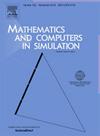An enhanced Kepler optimization algorithm with global attraction model and dynamic neighborhood search for global optimization and engineering problems
IF 4.4
2区 数学
Q1 COMPUTER SCIENCE, INTERDISCIPLINARY APPLICATIONS
引用次数: 0
Abstract
The Kepler optimization algorithm (KOA) is a recently proposed physics-based algorithm inspired by Kepler’s laws. Despite the strong competitiveness of KOA relative to established algorithms, it faces challenges such as limited search capability, premature convergence, and low convergence accuracy in solving complex optimization problems. To address these shortcomings, we propose an enhanced KOA (EKOA) that integrates a global attraction model, a dynamic neighborhood search operator, and a local update strategy with multi-elite guided differential mutation. Firstly, EKOA introduces an innovative global attraction model to facilitate information exchange among individuals, aiming to extend the search space and improve search efficiency. Secondly, a dynamic neighborhood search operator is designed to weaken the influence of the best individual on the current position updates, thereby mitigating premature convergence. Finally, a local update strategy with multi-elite guided differential mutation is developed to provide new evolutionary opportunities for individuals, ensure evolution in a more favorable direction, and prevent stagnation of the optimal solution during the optimization process. The performance of EKOA is evaluated by comparing it with 12 state-of-the-art algorithms using the CEC2017, CEC2020, and CEC2022 benchmark test suites. Experimental results and statistical analysis substantiate the superiority of EKOA. Additionally, the practical applicability of EKOA is demonstrated through four real-world engineering problems. In conclusion, EKOA not only effectively enhances the performance of the original KOA but also emerges as a powerful and promising algorithm for solving complex engineering problems.
基于全局吸引模型和动态邻域搜索的改进Kepler优化算法求解全局优化和工程问题
开普勒优化算法(KOA)是最近提出的一种基于开普勒定律的物理算法。尽管KOA算法相对于已有算法具有较强的竞争力,但在求解复杂优化问题时仍面临搜索能力有限、过早收敛、收敛精度低等挑战。为了解决这些问题,我们提出了一种集成了全局吸引模型、动态邻域搜索算子和多精英引导差分突变的局部更新策略的增强KOA (EKOA)。首先,EKOA引入了一种创新的全球吸引力模型,促进了个体之间的信息交换,旨在扩大搜索空间,提高搜索效率。其次,设计一个动态邻域搜索算子,减弱最优个体对当前位置更新的影响,从而减少过早收敛;最后,提出了一种多精英引导差异突变的局部更新策略,为个体提供新的进化机会,保证其向更有利的方向进化,防止优化过程中最优解停滞。通过使用CEC2017、CEC2020和CEC2022基准测试套件,将EKOA与12种最先进的算法进行比较,对其性能进行评估。实验结果和统计分析证实了EKOA的优越性。此外,通过四个实际工程问题证明了EKOA的实际适用性。综上所述,EKOA不仅有效地提高了原始KOA的性能,而且在解决复杂工程问题方面也成为一种强大而有前途的算法。
本文章由计算机程序翻译,如有差异,请以英文原文为准。
求助全文
约1分钟内获得全文
求助全文
来源期刊

Mathematics and Computers in Simulation
数学-计算机:跨学科应用
CiteScore
8.90
自引率
4.30%
发文量
335
审稿时长
54 days
期刊介绍:
The aim of the journal is to provide an international forum for the dissemination of up-to-date information in the fields of the mathematics and computers, in particular (but not exclusively) as they apply to the dynamics of systems, their simulation and scientific computation in general. Published material ranges from short, concise research papers to more general tutorial articles.
Mathematics and Computers in Simulation, published monthly, is the official organ of IMACS, the International Association for Mathematics and Computers in Simulation (Formerly AICA). This Association, founded in 1955 and legally incorporated in 1956 is a member of FIACC (the Five International Associations Coordinating Committee), together with IFIP, IFAV, IFORS and IMEKO.
Topics covered by the journal include mathematical tools in:
•The foundations of systems modelling
•Numerical analysis and the development of algorithms for simulation
They also include considerations about computer hardware for simulation and about special software and compilers.
The journal also publishes articles concerned with specific applications of modelling and simulation in science and engineering, with relevant applied mathematics, the general philosophy of systems simulation, and their impact on disciplinary and interdisciplinary research.
The journal includes a Book Review section -- and a "News on IMACS" section that contains a Calendar of future Conferences/Events and other information about the Association.
 求助内容:
求助内容: 应助结果提醒方式:
应助结果提醒方式:


